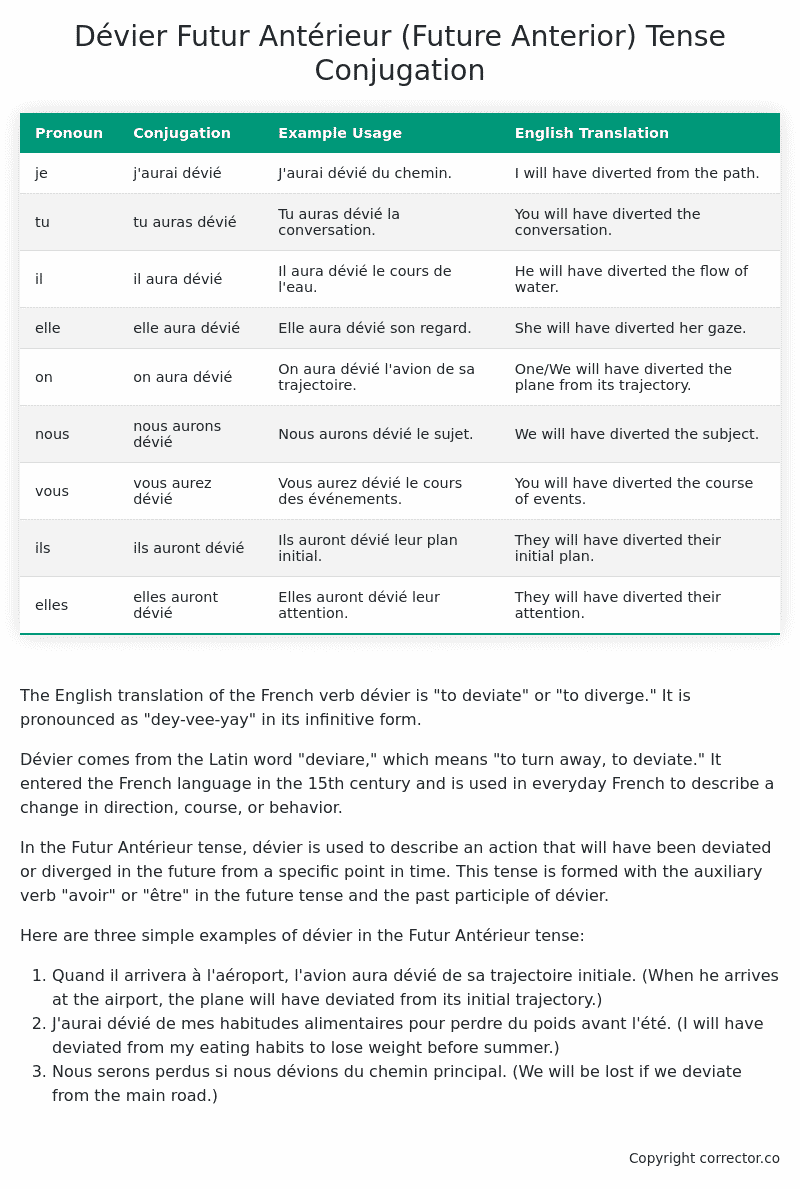Futur Antérieur (Future Anterior) Tense Conjugation of the French Verb dévier
Introduction to the verb dévier
The English translation of the French verb dévier is “to deviate” or “to diverge.” It is pronounced as “dey-vee-yay” in its infinitive form.
Dévier comes from the Latin word “deviare,” which means “to turn away, to deviate.” It entered the French language in the 15th century and is used in everyday French to describe a change in direction, course, or behavior.
In the Futur Antérieur tense, dévier is used to describe an action that will have been deviated or diverged in the future from a specific point in time. This tense is formed with the auxiliary verb “avoir” or “être” in the future tense and the past participle of dévier.
Here are three simple examples of dévier in the Futur Antérieur tense:
- Quand il arrivera à l’aéroport, l’avion aura dévié de sa trajectoire initiale. (When he arrives at the airport, the plane will have deviated from its initial trajectory.)
- J’aurai dévié de mes habitudes alimentaires pour perdre du poids avant l’été. (I will have deviated from my eating habits to lose weight before summer.)
- Nous serons perdus si nous dévions du chemin principal. (We will be lost if we deviate from the main road.)
Table of the Futur Antérieur (Future Anterior) Tense Conjugation of dévier
| Pronoun | Conjugation | Example Usage | English Translation |
|---|---|---|---|
| je | j’aurai dévié | J’aurai dévié du chemin. | I will have diverted from the path. |
| tu | tu auras dévié | Tu auras dévié la conversation. | You will have diverted the conversation. |
| il | il aura dévié | Il aura dévié le cours de l’eau. | He will have diverted the flow of water. |
| elle | elle aura dévié | Elle aura dévié son regard. | She will have diverted her gaze. |
| on | on aura dévié | On aura dévié l’avion de sa trajectoire. | One/We will have diverted the plane from its trajectory. |
| nous | nous aurons dévié | Nous aurons dévié le sujet. | We will have diverted the subject. |
| vous | vous aurez dévié | Vous aurez dévié le cours des événements. | You will have diverted the course of events. |
| ils | ils auront dévié | Ils auront dévié leur plan initial. | They will have diverted their initial plan. |
| elles | elles auront dévié | Elles auront dévié leur attention. | They will have diverted their attention. |
Other Conjugations for Dévier.
Le Present (Present Tense) Conjugation of the French Verb dévier
Imparfait (Imperfect) Tense Conjugation of the French Verb dévier
Passé Simple (Simple Past) Tense Conjugation of the French Verb dévier
Passé Composé (Present Perfect) Tense Conjugation of the French Verb dévier
Futur Simple (Simple Future) Tense Conjugation of the French Verb dévier
Futur Proche (Near Future) Tense Conjugation of the French Verb dévier
Plus-que-parfait (Pluperfect) Tense Conjugation of the French Verb dévier
Passé Antérieur (Past Anterior) Tense Conjugation of the French Verb dévier
Futur Antérieur (Future Anterior) Tense Conjugation of the French Verb dévier (this article)
Subjonctif Présent (Subjunctive Present) Tense Conjugation of the French Verb dévier
Subjonctif Passé (Subjunctive Past) Tense Conjugation of the French Verb dévier
Subjonctif Imparfait (Subjunctive Imperfect) Tense Conjugation of the French Verb dévier
Subjonctif Plus-que-parfait (Subjunctive Pluperfect) Tense Conjugation of the French Verb dévier
Conditionnel Présent (Conditional Present) Tense Conjugation of the French Verb dévier
Conditionnel Passé (Conditional Past) Tense Conjugation of the French Verb dévier
L’impératif Présent (Imperative Present) Tense Conjugation of the French Verb dévier
L’infinitif Présent (Infinitive Present) Tense Conjugation of the French Verb dévier
Struggling with French verbs or the language in general? Why not use our free French Grammar Checker – no registration required!
Get a FREE Download Study Sheet of this Conjugation 🔥
Simply right click the image below, click “save image” and get your free reference for the dévier Futur Antérieur tense conjugation!

Dévier – About the French Futur Antérieur (Future Anterior) Tense
Construction
Common Everyday Usage Patterns
Interactions with Other Tenses
For example
Summary
I hope you enjoyed this article on the verb dévier. Still in a learning mood? Check out another TOTALLY random French verb conjugation!


